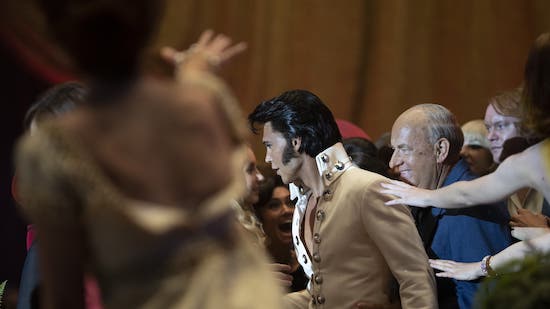Baz Luhrmann was never going to make a biopic. His film about Elvis Presley, the highest-selling recording artist of all time, was always going to be about so much more than the man himself. It is a million-mile-a-minute show, a performance of greed and ambition and loneliness and despair and grief and bravery. Elvis is a film about performing, which is what all of Baz Luhrmann’s films have always been about. It wasn’t going to start getting easy now.
Instead of diving deep into the mind of the man who had the talent to write and sing all the records that got him – and us – to where we are today, Elvis says more about the man who manipulated that talent as if his life depended on it. For Luhrmann, hopelessly devoted to the tragic romance of an omniscient narrator, it makes sense to have Tom Hanks’ wildly unreliable Colonel Tom Parker (not actually a colonel, nor a Tom, or even a Parker) hold our hand here – but that doesn’t mean it works.
It is, of course, a good thing that the man playing Elvis is unquestionably good at playing Elvis. But he’s gasping for air in between Hank’s Dutch riff on Jim Broadbent’s Moulin Rouge! ringmaster – somewhat studying his source material but getting lost in his director’s ever-increasingly camp worlds that will always take greater care of the spectacle than the people, be they puppets or their puppeteers.
Yet there is still a strange amount to love in this beast of a film – as despite a bloated runtime of two hours and 40 minutes there still remains so much undiscovered about Elvis (his film career is touched on in sentences, his marriage only punctuated by one Kacey Musgraves cover and a forlorn epilogue to send us off) in this dizzying distillation of his life and work. It can feel like the very best and worst live music experiences, waiting for the chatty interludes to pass before getting back to the hits as much as you then yawn at every overindulgent live solo or audience interaction wasting time. It’s all too much, but you miss it the second it ends.
Although, the details Luhrmann does zero in on – and ends up blowing up until they blind you – are fascinating. In the early days of Presley’s career, much is made of his “wiggle”, with his compulsion to move his hips quickly becoming an essential part of his work as a musician. Today it’s a bit of fun, back then it was a crime. Crash zooms onto Butler’s crotch thrill onscreen teens and painfully echo the seasick filmmaking style of Bohemian Rhapsody (the similarities end with both films’ love of extremes), geeing the film up to become the story of something much more frenetic than the life of a man who, beneath all that shaking, was in a lot of pain.

Again, it’s not a biopic, and so Luhrmann brushes over Presley’s struggle with alcohol and pills (Hanks as Parker growls just one line of narration – so let’s say six seconds out of approximately 9000) to allow more time each time to return to the superstar’s gruelling five-year residency in Las Vegas (knowing, at least, to sour the tone of ‘Viva Las Vegas’ for just a minute.) It is much more about mood than the specific moments that made up Presley, finding curious and compelling parallels in his music and the striking emotional beats of his life.
Of course, ‘If I Can Dream’ tells its own story, Presley’s version performed just two months after the assassination of Martin Luther King (which the film heavily leans into) but then megahits like ‘Suspicious Minds’ colour the screen retelling with its own tension that adds even greater depth to the song. It seems, thank god, that the compilation album Luhrmann boasted – featuring the likes of Eminem, Tame Impala, Maneskin, Diplo and Kacey Musgraves – is mostly relegated to the charts and “Inspired By” shelves as opposed to dubbing Presley’s back catalogue in the film. Plus, that would be a criminal act when Butler sings the king’s songs so well.
The young actor was raised by the House of Mouse and popped up in sugar-sweet teen stories like Sex and the City prequel series The Carrie Diaries and before that Nickelodeon’s Zoey 101. There’s never been much questioning his talent, with a more recent foray into arthouse territory with two prior Cannes titles in Jim Jarmusch’s The Dead Don’t Die and Once Upon A Time in Hollywood by Quentin Tarantino, but he’s never had the chance to take to the stage like this. Talking, singing, wiggling, walking, Butler is Presley and Presley is Butler.
But at the end of it all, it will always be just another Baz Luhrmann film. It is his show, his obsession with spectacle, tragedy, opulence and romance. The story of a boy nobody believed in who gave the world the best night of their life. A celebration of everything the filmmaker’s ever done, a middle finger to those who never believed in the king. A legacy to cherish forever.
Elvis will be released in cinemas on June 24


